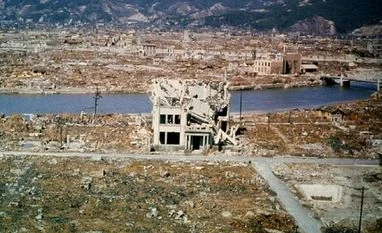August 6, 2022, will mark the 77th anniversary of the US dropping an atomic bomb on Hiroshima. United Nations (UN) chief Antonio Guterres will visit Japan on Saturday, "at a time of nuclear danger not seen since the height of the Cold War," as reported by Associated Press.
On August 6, 1945, the US dropped a nuclear bomb on Hiroshima in Japan, killing 140,000 people. Three days later, on August 9, 1945, it dropped another bomb on Nagasaki, killing nearly 74,000 people. On August 15, the same year, Japan surrendered to the allies, ending World War 2.
Four years later, in 1949, the Soviet Union tested its first nuclear bomb. The UK followed it in 1952, France in 1960 and China in 1964.
Since the end of World War, the world has come close to seeing another nuclear attack several times. The most serious among these was the Cuban Missile Crisis in 1962, when the US and the Soviet Union confronted each other in a 13-day intense political and military standoff.
What is the state of nuclear weapons today?
In 2022, nine countries possess over 13,000 nuclear warheads. However, the exact number of these bombs is difficult to know as it is kept confidential by the governments.
According to the International Campaign to Abolish Nuclear Weapons (ICAN), Russia has 6,255 nuclear warheads, the highest in the world. It is followed by the US with 5,550 such bombs. And China comes in a distant third place with 350 nuclear warheads. The US and Russia combined own nearly 90 per cent of the world's nuclear weapons.
Other countries that possess or claim to possess nuclear bombs are France, the UK, Pakistan, India, Israel and North Korea (Chart 1).
Five other nations host America's nuclear warheads. These are Turkey, Italy, Belgium, Germany, and the Netherlands. Turkey holds 50, the highest number of warheads on the list.
The list, however, does not end here. Twenty-seven countries endorse the use of nuclear weapons on their behalf by North Atlantic Treaty Organisation (NATO) and Collective Security Treaty Organisation (CSTO). Australia, Belgium, Canada, Japan, South Korea and Spain are among these 27 countries.
Belarus, Kazakhstan and Ukraine received nuclear warheads from the Soviet Union after it was dismantled in 1991. However, they returned the warheads to Russia after joining the Non-Proliferation Treaty (NPT) in 1994.
What efforts are being taken to prevent a nuclear war?
The world saw the horrors of Hiroshima and Nagasaki with fear and dread. Soon after the war ended, countries came together to stop countries from using nuclear weapons. The most significant treaty in this regard is the NPT.
In 1968, the NPT opened for signatures and was implemented in 1970. On May 11, 1995, it was extended indefinitely. According to the latest data from the United Nations website, the treaty currently has 191 (190 excluding North Korea) members, including five nuclear nations. Only India, Pakistan, Israel and North Korea (uncertain) have not signed the treaty.
North Korea's membership remains uncertain as it quit the treaty in 2003, but the member states have not accepted it.
NPT aims to "prevent the spread of nuclear weapons and weapons technology, to promote cooperation in the peaceful uses of nuclear energy and to further the goal of achieving nuclear disarmament and general and complete disarmament," according to the UN.
The International Atomic Energy Agency (IAEA) inspects the countries for compliance with the treaty.
In 1996, the Comprehensive Test Ban Treaty (CTBT) opened for signatures. It aims to prevent countries from conducting any nuclear test or explosion.
One hundred eighty-five countries have signed the treaty so far, and 172 have ratified it. However, it cannot come into force until 44 states ratify it. Eight of these are yet to sign the treaty, including the US, China, India and Pakistan.
Unlock 30+ premium stories daily hand-picked by our editors, across devices on browser and app.
Pick your 5 favourite companies, get a daily email with all news updates on them.
Full access to our intuitive epaper - clip, save, share articles from any device; newspaper archives from 2006.
Preferential invites to Business Standard events.
Curated newsletters on markets, personal finance, policy & politics, start-ups, technology, and more.
)